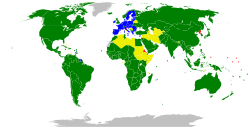World Trade Organization
| Organisation mondiale du commerce (in French) Organización Mundial del Comercio (in Spanish) | |
 | |

Members
Members, dually represented by the EU
Observers
Non-participant states
| |
| Formation | 1 January 1995 |
|---|---|
| Type | International trade organization |
| Purpose | Regulate international trade |
| Headquarters | Centre William Rappard, Geneva, Switzerland |
| Coordinates | 46.12°N 6.09°E |
Region served
| Worldwide |
Membership
| 164 member states[1] |
Official language
| English, French, Spanish[2] |
| Roberto Azevêdo | |
Budget
| 197.2 million Swiss francs(approx. 209 million US$) in 2017. |
Staff
| 640 |
| Website | www |
The World Trade Organization (WTO) is an intergovernmental organizationthat regulates international trade. The WTO officially commenced on 1 January 1995 under the Marrakesh Agreement, signed by 123 nations on 15 April 1994, replacing the General Agreement on Tariffs and Trade (GATT), which commenced in 1948. It is the largest international economic organization in the world.[5][6] The WTO deals with regulation of trade in goods, services and intellectual property between participating countries by providing a framework for negotiating trade agreements and a dispute resolution process aimed at enforcing participants' adherence to WTO agreements, which are signed by representatives of member governments and ratified by their parliaments. Most of the issues that the WTO focuses on derive from previous trade negotiations, especially from the Uruguay Round (1986–1994).
The WTO's current Director-General is Roberto Azevêdo, who leads a staff of over 600 people in Geneva, Switzerland. A trade facilitation agreement, part of the Bali Package of decisions, was agreed by all members on 7 December 2013, the first comprehensive agreement in the organization's history. On 23 January 2017, the amendment to the WTO Trade Related Aspects of Intellectual Property Rights (TRIPS) Agreement marks the first time since the organization opened its doors in 1995 that WTO accords have been amended, and this change should secure for developing countries a legal pathway to access affordable remedies under WTO rules.

No comments:
Post a Comment